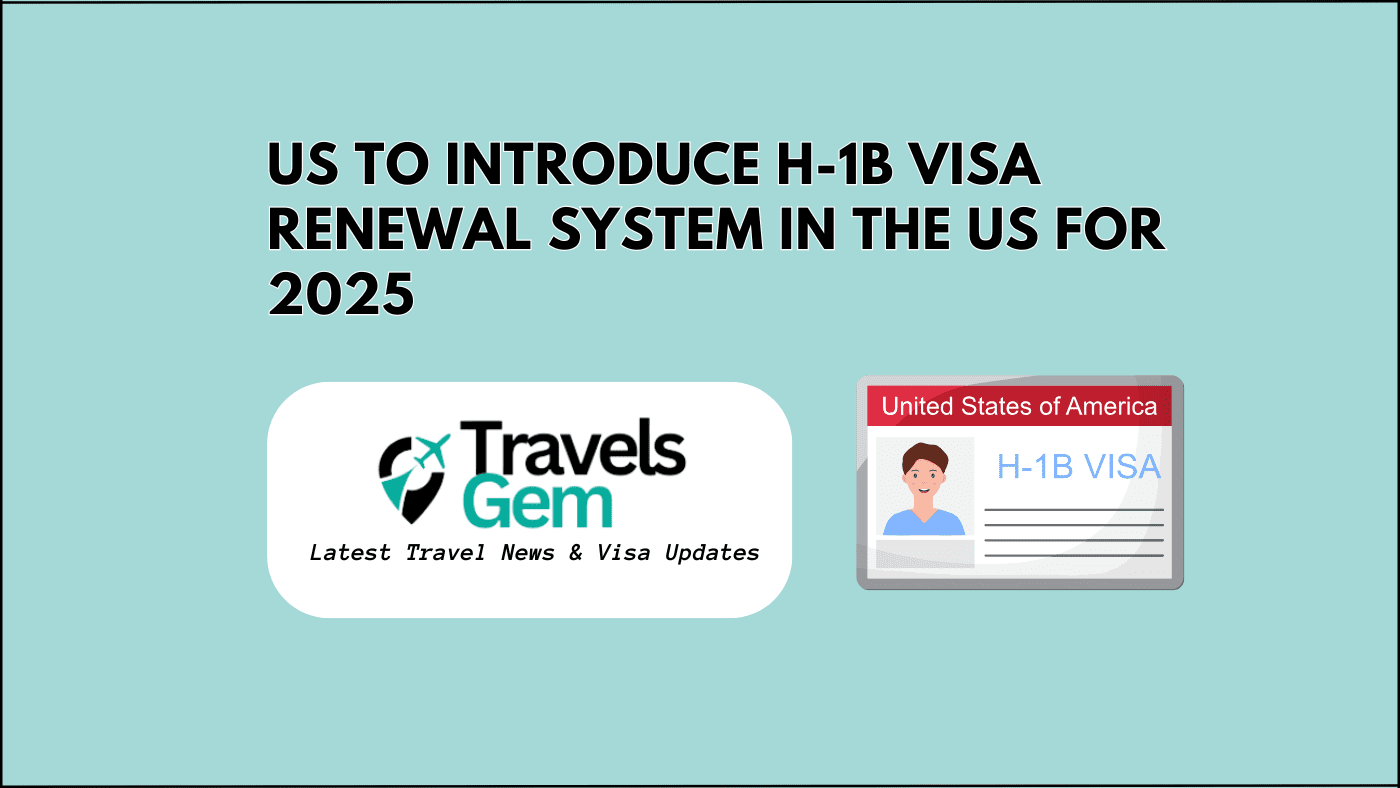The United States is set to launch a domestic H-1B visa renewal system in 2025, making life easier for skilled workers, especially from India. This program will let H-1B visa holders renew their visas without leaving the country, saving time and money. After a successful pilot in 2024, the US Department of State is working to make this a permanent system. This article explains the H-1B visa renewal 2025 program, who can use it, its benefits, and tips for applicants, using data up to May 6, 2025. Written in simple English, it helps workers from India, Nigeria, or elsewhere plan ahead.
What Is the Domestic H-1B Visa Renewal System?
The H-1B visa lets skilled workers in fields like technology, healthcare, and engineering work in the US for up to 6 years, with renewals every 3 years. Currently, most H-1B holders must travel to their home country, like India, for visa stamping at a US consulate. This process is slow, with long waits for appointments—sometimes months in Chennai or Mumbai—and high travel costs.
The H-1B visa renewal 2025 program changes this. It allows eligible H-1B holders to renew their visas inside the US, without international travel. A pilot program from January 29 to April 1, 2024, tested this for 20,000 applicants and worked well, processing renewals in about 2–3 weeks. The US Department of State now plans a formal program in 2025, open to more H-1B holders and possibly H-4 dependents (spouses and children).
Who Can Use the 2025 Program?
The 2024 pilot had strict rules, limiting renewals to H-1B holders with visas issued in Canada (January 2020–April 2023) or India (February 2021–September 2021). The 2025 program is expected to be broader, based on official statements and feedback. While exact rules are not yet set, likely requirements include:
- H-1B Visa Holders: Must be renewing an H-1B visa, not other types like L-1 or O-1.
- Valid Status: Must have an approved, unexpired H-1B petition and be in H-1B status in the US.
- Interview Waiver: Must qualify for a waiver of the in-person interview, meaning the prior visa was issued within 48 months and has no “clearance received” note.
- Fingerprints: Must have 10 fingerprints on file from a past visa application.
- No Reciprocity Fee: Must be from a country not charged a visa issuance fee, like India.
- Broader Locations: Unlike the pilot, visas issued at any US consulate (not just Canada or India) may qualify.
- H-4 Dependents: H-4 visa holders (spouses and children) may be included, unlike the pilot.
Check travel.state.gov for final eligibility when the program launches, as rules may change.
Benefits of the 2025 Program
The H-1B visa renewal 2025 program offers big advantages, especially for Indian workers, who made up 72% of H-1B approvals in 2023. Key benefits include:
- No Travel Needed: Renew visas in the US, avoiding costly trips to India or elsewhere. This saves $1,000–$2,000 in flights and lodging.
- Faster Processing: The pilot took 2–3 weeks, compared to months for consulate appointments in Chennai or Delhi.
- Fewer Delays: No waiting for Dropbox slots, which are limited in India due to high demand.
- Less Disruption: Workers can stay on the job, avoiding weeks away from work or family.
- Helps Employers: US companies, especially in tech, keep workers without travel interruptions, boosting productivity.
- H-4 Inclusion: If H-4 dependents are included, families can renew together, reducing stress.
For example, Neeti Sharma, CEO of TeamLease Digital, said the program cuts costs and keeps businesses running smoothly by avoiding travel disruptions.
How Will the Program Work?
The H-1B visa renewal 2025 program is still being planned, but it will likely follow the 2024 pilot’s process, with improvements. Here’s what to expect:
- Online Application: Apply via a dedicated website, like the pilot’s at travel.state.gov. Fill out Form DS-160 and answer a questionnaire to check eligibility.
- Documents: Submit your passport, current H-1B visa, I-94 form, approved H-1B petition (I-797), and proof of US job (e.g., pay stubs).
- Fees: Pay a nonrefundable fee, likely $205 as in the pilot. No extra reciprocity fee for Indians.
- Processing: The US Department of State’s Visa Office in Washington, D.C., will handle applications. Expect 2–3 weeks for approval.
- Mailing: Send your passport to the Visa Office and get it back with a new visa stamp via mail.
- Tracking: Use an online tool to check application status, similar to VFS Global’s system.
The program may allow year-round applications, unlike the pilot’s short window. A new consular division in Washington, D.C., may be set up to handle the workload. Visit travel.state.gov for updates on the launch date and process.
Tips for a Smooth H-1B Visa Renewal in 2025
To prepare for the H-1B visa renewal 2025 program, follow these tips:
- Check Eligibility Early: Use the online navigator tool at travel.state.gov to confirm you qualify once rules are announced.
- Gather Documents: Collect your passport, I-797 form, I-94, pay stubs, and job letter now to avoid last-minute stress.
- Apply Early: Submit as soon as the program opens to avoid delays, especially in peak seasons like winter.
- Plan Travel: If you need to travel abroad, renew your visa first, as you’ll need a valid stamp to reenter the US.
- Check H-4 Status: If H-4 dependents are included, ensure their documents (e.g., I-94, marriage certificate) are ready.
- Monitor Updates: Visit travel.state.gov or uscis.gov for launch dates and rule changes.
- Audit Visa Records: Work with your employer’s HR to ensure your H-1B petition and I-94 are valid.
- Avoid Errors: Double-check Form DS-160 for mistakes, as errors can delay approval.
Challenges and What’s Next
The H-1B visa renewal 2025 program faces some hurdles. Setting up a new consular division in Washington, D.C., is a big task, and the program’s launch date isn’t confirmed due to planning needs. Political changes, like a new US administration in 2025, could affect the timeline, though businesses are likely to push for the program due to its benefits.
The program may start with H-1B and H-4 visas but could expand to other types, like L-1 or O-1, if successful. In 2024, 65% of the 400,000 H-1B approvals were renewals, showing high demand for this system. Indian workers, who dominate the H-1B program, will benefit most, strengthening US-India tech ties.
Why This Matters
The H-1B visa renewal 2025 program is a game-changer for skilled workers. It cuts costs, saves time, and keeps workers in the US, helping both employees and employers. For Indian professionals, who face long consulate waits, this program is a big relief. Aditya Narayan Mishra, CEO of CIEL HR, said it boosts confidence for workers and reduces financial strain.
The program also supports the US economy. H-1B workers drive innovation in tech, healthcare, and more. By simplifying renewals, the US keeps global talent, as supported by leaders like Elon Musk, who said H-1B visas help America stay competitive.
Conclusion
The US is set to launch a domestic H-1B visa renewal 2025 program, letting workers renew visas without leaving the country. Building on a 2024 pilot, it will save time, cut costs, and include H-4 dependents. Eligible H-1B holders should prepare documents, check travel.state.gov for updates, and apply early. The program strengthens the US-India talent pipeline and supports businesses. Visit travel.state.gov or uscis.gov for details and start planning your renewal today.





